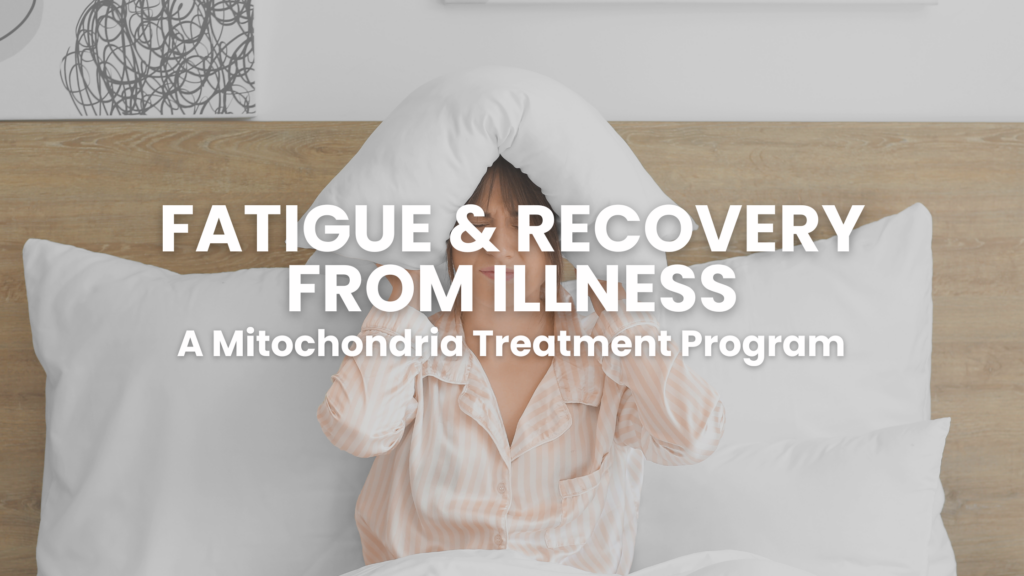Chronic Fatigue & Recovering from Illness

A common issue for people who come to Blum Center is that they are tired and wish they had more energy. We always begin by searching for the root cause by looking for nutrient deficiencies; hormone imbalances including thyroid or adrenals; damage from stress and poor sleep; metabolic issues causing fluctuations in blood sugar; toxin overload; and persistent infectious diseases.
Sometimes the root cause is simple to treat and you recover quickly. But for some of you, especially if you’ve seen other Functional Medicine providers and still have fatigue, we need to dig further.
This is where the mitochondria come in. They are especially damaged from Covid or other viruses; Lyme or other tick or bacterial infections; and Environmental toxins, especially mold. Often, the chronic fatigue experienced by people trying to recover from a significant illness comes from damage to the mitochondria. This is why we created this program. It might just be the missing piece to your health puzzle.
What are Mitochondria?
Mitochondria are often called the “powerhouses of the cell” because they are responsible for generating most of your adenosine triphosphate (ATP), which is the primary energy currency used by all the cells in your body. ATP is produced through a process called oxidative phosphorylation, which involves the transfer of electrons from molecules derived from food (such as glucose and fatty acids) to proteins inside the mitochondria. Because they focus on the burning of carbohydrates and fats for fuel, Mitochondria play a central role in your metabolism
How Do Mitochondria Get Damaged?
Having well functioning, strong mitochondria, are crucial for your overall wellbeing and also for staying strong and energetic as you age. The challenge is that mitochondria can be damaged easily, especially from environmental exposures and infections. Here is how that happens:
- Exposure to Environmental Toxins, pollutants, and xenobiotics can damage mitochondria and impair their function. Some toxins, such as heavy metals, pesticides, and industrial chemicals, can disrupt mitochondrial membranes, interfere with oxidative phosphorylation, and induce oxidative stress (damage from free radicals).
- Oxidative Damage : Mitochondria generate enormous amounts of free radicals (also called ROS or reactive oxygen species) as byproducts of their everyday functioning. Think of it like a car engine that’s throwing off a lot of sparks. While ROS play important roles in cellular signaling and defense against pathogens, too much of a good thing can lead to oxidative stress, causing damage to the mitochondria itself, crippling its function, and contributing to various diseases and aging processes. Persistent infections like Lyme disease and EBV, are likely other viruses like COVID, are thought to damage the mitochondria this way, leading to chronic fatigue and other complications.
- Mitochondrial Damage Associated with Aging: Mitochondria are particularly vulnerable to damage during the aging process. Accumulation of oxidative damage, mitochondrial DNA mutations, and alterations in mitochondrial dynamics occur with aging, leading to mitochondrial dysfunction and decline in cellular function. Age-related mitochondrial damage is thought to contribute to the development of age-related diseases and the aging process itself.
Symptoms of Mitochondrial Dysfunction
Since mitochondria are present in nearly every cell of the body and play diverse roles in cellular metabolism and energy production, the symptoms of mitochondrial dysfunction can vary widely depending on the tissues and organs affected. Here are the symptoms that for us are a red flag that your mitochondria might be the problem:
- Fatigue and Weakness: Mitochondria are responsible for generating the majority of the cell’s energy in the form of ATP, and when they are not functioning optimally, you might feel fatigue, weakness, and lethargy.
- Muscle Weakness and Pain: Skeletal muscles are heavily dependent on mitochondrial energy production for contraction and movement. You might experience muscle weakness, cramps, and pain, especially during physical activity.
- Exercise Intolerance: You may tire quickly during exercise and have reduced stamina and endurance.
- Neurological Symptoms: Dysfunction of mitochondria in neurons can lead you to experience cognitive impairment, memory loss, difficulty concentrating, headaches, migraines, neuropathic pain, and mood disturbances.
Testing and Repairing Your Mitochondria Damage:
Our Mito Recovery program offers a comprehensive evaluation and treatment program to help your mitochondria recover and restore your health.
- The first step is to identify why and how your mitochondria got damaged, and then to help you eliminate these exposures if they are environmental or infectious. Common culprits are infectious disease, mold, and environmental toxins.
- We will check the functioning of your mitochondria with MitoSwab testing. The test is done with a simple scrape from the inside of your cheek, and results show us your mitochondrial biogenesis (total numbers of mitochondria) and the functioning of Complexes 1, 2, 3 and 4.
- We measure levels of oxidative stress and glutathione.
- Treatment: Based on these results we offer targeted treatments, which may include Infusions (NAD, glutathione, lipoic acid, CoQ10, carnitine, B vitamins and magnesium), supplements, and intermittent caloric restriction/fasting (great for mitochondria function!). For example, low Complex 1 responds well to NAD. Riboflavin is good for Complex 2, and CoQ10 for Complex 3. And both Glutathione and lipoic acid are great for treating oxidative stress, which is an issue for all the 4 complexes if they are damaged.
Suspect your Mitochondria Need Help?
Schedule an appointment with one of our Functional Medicine practitioners! Call 914.652.7800 to book your appointment or click here to schedule a consultation with one of our Functional Medicine providers.
Our Infusion Center is open to everyone, whether you are new to Blum Center, or an existing patient. If you are battling long-Covid, recovering from the latest wave, or simply think (after reading this article) that your mitochondria need support, come in for our Mito Recovery IV. Our infusion is a bundle of the most important ingredients to support and repair mitochondria function. The main IV bag includes B vitamins, magnesium, and L-carnitine. Then we add-on 3 boosters that need to be given separately: Glutathione, Lipoic acid and CoQ10. And if you are really tired? Try our discounted package of 4 and come every week. You will thank us!
